Deck 12: Aggregate Demand and Aggregate Supply
Question
Question
Question
Question
Question
Question
Question
Question
Question
Question
Question
Question
Question
Question
Question
Question
Question
Question
Question
Question
Question
Question
Question
Question
Question
Question
Question
Question
Question
Question
Question
Question
Question
Question
Question
Question
Question
Question
Question
Question
Question
Question
Question
Question
Question
Question
Question
Question
Question
Question
Question
Question
Question
Question
Question
Question
Question
Question
Question
Question
Question
Question
Question
Question
Question
Question
Question
Question
Question
Question
Question
Question
Question
Question
Question
Question
Question
Question
Question
Question

Unlock Deck
Sign up to unlock the cards in this deck!
Unlock Deck
Unlock Deck
1/229
Play
Full screen (f)
Deck 12: Aggregate Demand and Aggregate Supply
1
The shape of the aggregate demand curve is explained by the:
A) interest rate,real balances,and foreign trade effects.
B) rate of inflation and the natural rate of unemployment.
C) policies to stabilize prices and reduce unemployment.
D) ratchet effect.
A) interest rate,real balances,and foreign trade effects.
B) rate of inflation and the natural rate of unemployment.
C) policies to stabilize prices and reduce unemployment.
D) ratchet effect.
interest rate,real balances,and foreign trade effects.
2
The following table is for a particular country in which C is consumption expenditures,Ig is gross investment expenditures,G is government expenditures,X is exports,and M is imports.All figures are in billions of dollars.Each question is independent of the other questions.

Which of the following is incorrect?
A) As the Canadian price level rises,Canadian goods become relatively more expensive so that its exports fall and its imports rise.
B) As the price level falls,the demand for money declines,the interest rate declines,and interest rate-sensitive spending increases.
C) When the price level increases,real balances increase,businesses and households find themselves wealthier and therefore increase their spending.
D) Given aggregate demand,an increase in aggregate supply increases real output and,assuming downward flexible prices,reduces the price level.

Which of the following is incorrect?
A) As the Canadian price level rises,Canadian goods become relatively more expensive so that its exports fall and its imports rise.
B) As the price level falls,the demand for money declines,the interest rate declines,and interest rate-sensitive spending increases.
C) When the price level increases,real balances increase,businesses and households find themselves wealthier and therefore increase their spending.
D) Given aggregate demand,an increase in aggregate supply increases real output and,assuming downward flexible prices,reduces the price level.
When the price level increases,real balances increase,businesses and households find themselves wealthier and therefore increase their spending.
3
The real-balances effect indicates that:
A) an increase in the price level will increase the demand for money,increase interest rates,and reduce consumption and investment spending.
B) a lower price level will decrease the real value of many financial assets and therefore reduce spending.
C) a higher price level will increase the real value of many financial assets and therefore increase spending.
D) a higher price level will decrease the real value of many financial assets and therefore reduce spending.
A) an increase in the price level will increase the demand for money,increase interest rates,and reduce consumption and investment spending.
B) a lower price level will decrease the real value of many financial assets and therefore reduce spending.
C) a higher price level will increase the real value of many financial assets and therefore increase spending.
D) a higher price level will decrease the real value of many financial assets and therefore reduce spending.
a higher price level will decrease the real value of many financial assets and therefore reduce spending.
4
The interest-rate effect suggests that:
A) a decrease in the supply of money will increase interest rates and reduce interest-sensitive consumption and investment spending.
B) an increase in the price level will increase the demand for money,reduce interest rates,and decrease consumption and investment spending.
C) an increase in the price level will increase the demand for money,increase interest rates,and decrease consumption and investment spending.
D) an increase in the price level will decrease the demand for money,reduce interest rates,and increase consumption and investment spending.
A) a decrease in the supply of money will increase interest rates and reduce interest-sensitive consumption and investment spending.
B) an increase in the price level will increase the demand for money,reduce interest rates,and decrease consumption and investment spending.
C) an increase in the price level will increase the demand for money,increase interest rates,and decrease consumption and investment spending.
D) an increase in the price level will decrease the demand for money,reduce interest rates,and increase consumption and investment spending.

Unlock Deck
Unlock for access to all 229 flashcards in this deck.
Unlock Deck
k this deck
5
Other things being equal,the higher the price level,the lower the level of domestic output purchased.This occurs because of:
A) the real-balances effect.
B) consumer spending on capital goods.
C) the full-employment-unemployment rate.
D) the sensitivity to demand-pull inflation.
A) the real-balances effect.
B) consumer spending on capital goods.
C) the full-employment-unemployment rate.
D) the sensitivity to demand-pull inflation.

Unlock Deck
Unlock for access to all 229 flashcards in this deck.
Unlock Deck
k this deck
6
The interest rate effect indicates that a(n):
A) decrease in the price level will increase the demand for money,increase interest rates,and decrease consumption and investment spending.
B) decrease in the price level will decrease the demand for money,decrease interest rates,and increase consumption and investment spending.
C) increase in the price level will increase the demand for money,reduce interest rates,and decrease consumption and investment spending.
D) increase in the supply of money will increase interest rates and decrease interest-sensitive consumption and investment spending.
A) decrease in the price level will increase the demand for money,increase interest rates,and decrease consumption and investment spending.
B) decrease in the price level will decrease the demand for money,decrease interest rates,and increase consumption and investment spending.
C) increase in the price level will increase the demand for money,reduce interest rates,and decrease consumption and investment spending.
D) increase in the supply of money will increase interest rates and decrease interest-sensitive consumption and investment spending.

Unlock Deck
Unlock for access to all 229 flashcards in this deck.
Unlock Deck
k this deck
7
The real-balances,interest rate,and foreign trade effects all help explain:
A) why the aggregate demand curve is downward sloping.
B) why the aggregate supply curve is upward sloping.
C) shifts in the aggregate demand curve.
D) shifts in the aggregate supply curve.
A) why the aggregate demand curve is downward sloping.
B) why the aggregate supply curve is upward sloping.
C) shifts in the aggregate demand curve.
D) shifts in the aggregate supply curve.

Unlock Deck
Unlock for access to all 229 flashcards in this deck.
Unlock Deck
k this deck
8
The aggregate demand curve:
A) is upward sloping because a higher price level is necessary to make production profitable as production costs rise.
B) is downward sloping because production costs decline as real output increases?
C) shows the amount of expenditures required to induce the production of each possible level of real output.
D) shows the amount of real output which will be purchased at each possible price level.
A) is upward sloping because a higher price level is necessary to make production profitable as production costs rise.
B) is downward sloping because production costs decline as real output increases?
C) shows the amount of expenditures required to induce the production of each possible level of real output.
D) shows the amount of real output which will be purchased at each possible price level.

Unlock Deck
Unlock for access to all 229 flashcards in this deck.
Unlock Deck
k this deck
9
The aggregate demand curve shows the:
A) inverse relationship between the price level and real GDP purchased.
B) direct relationship between the price level and real GDP produced.
C) inverse relationship between interest rates and real GDP produced.
D) direct relationship between real-balances and real GDP purchased.
A) inverse relationship between the price level and real GDP purchased.
B) direct relationship between the price level and real GDP produced.
C) inverse relationship between interest rates and real GDP produced.
D) direct relationship between real-balances and real GDP purchased.

Unlock Deck
Unlock for access to all 229 flashcards in this deck.
Unlock Deck
k this deck
10
The following table is for a particular country in which C is consumption expenditures,Ig is gross investment expenditures,G is government expenditures,X is exports,and M is imports.All figures are in billions of dollars.

Refer to the above table.The interest rate effect of changes in the price level is shown by columns:
A) (1)and (4)of the table.
B) (5)and (6)of the table.
C) (1)and (3)of the table.
D) (2)and (4)of the table.

Refer to the above table.The interest rate effect of changes in the price level is shown by columns:
A) (1)and (4)of the table.
B) (5)and (6)of the table.
C) (1)and (3)of the table.
D) (2)and (4)of the table.

Unlock Deck
Unlock for access to all 229 flashcards in this deck.
Unlock Deck
k this deck
11
Which effect best explains the downward slope of the aggregate demand curve?
A) a multiplier effect
B) an income effect
C) a substitution effect
D) an interest rate effect
A) a multiplier effect
B) an income effect
C) a substitution effect
D) an interest rate effect

Unlock Deck
Unlock for access to all 229 flashcards in this deck.
Unlock Deck
k this deck
12
The following table is for a particular country in which C is consumption expenditures,Ig is gross investment expenditures,G is government expenditures,X is exports,and M is imports.All figures are in billions of dollars.Each question is independent of the other questions.

Refer to the above table.The wealth or real balances effect of changes in the price level is:
A) shown by columns (1)and (2)of the table.
B) shown by columns (1)and (5)of the table.
C) shown by columns (1)and (4)of the table.
D) not shown by the data in the table.

Refer to the above table.The wealth or real balances effect of changes in the price level is:
A) shown by columns (1)and (2)of the table.
B) shown by columns (1)and (5)of the table.
C) shown by columns (1)and (4)of the table.
D) not shown by the data in the table.

Unlock Deck
Unlock for access to all 229 flashcards in this deck.
Unlock Deck
k this deck
13
Which of the factors below best explain the downward slope of aggregate demand curve?
The following list of factors,are related to the aggregate demand curve.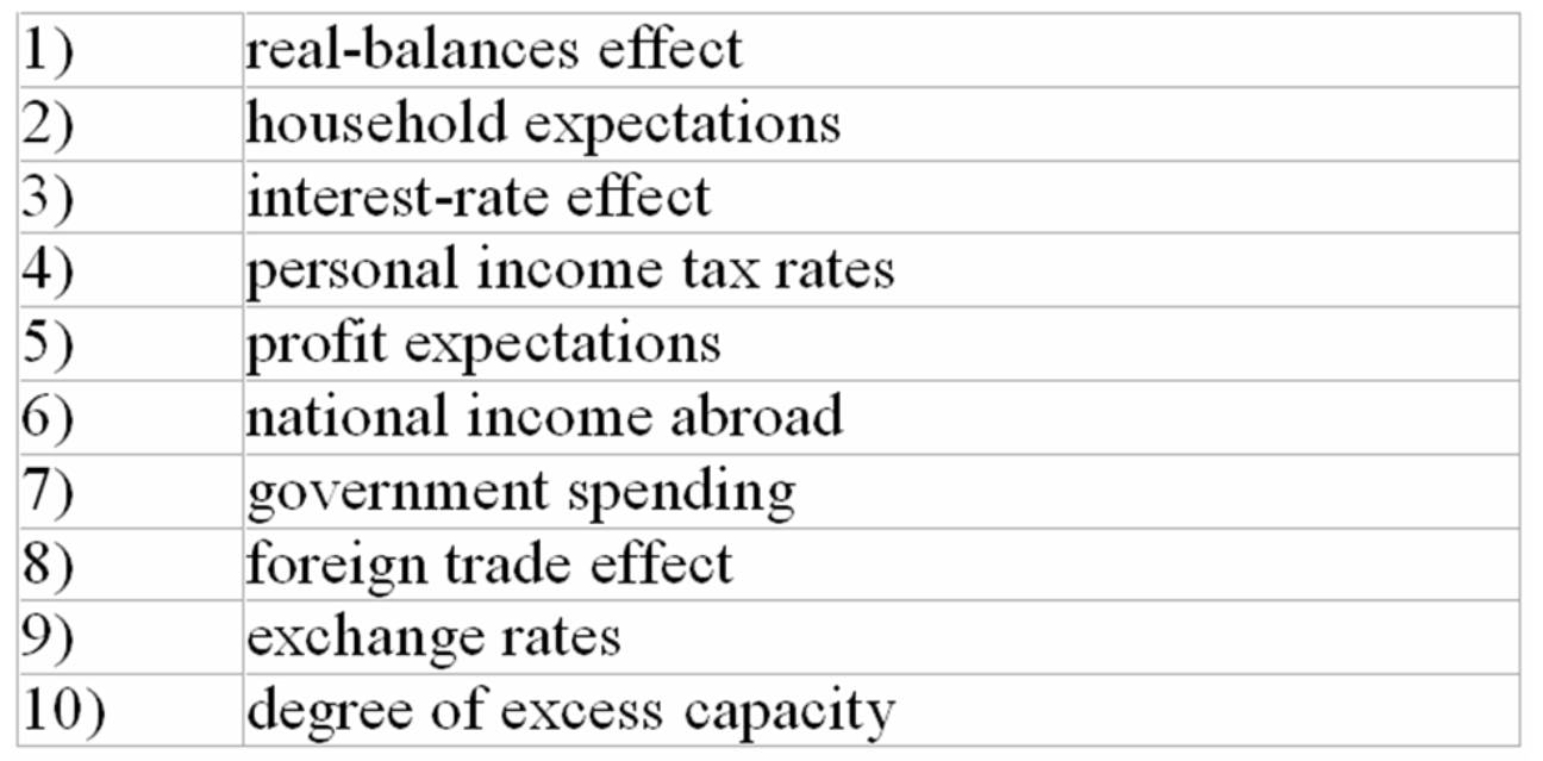
A) 2,4,and 6
B) 7,9,and 10
C) 1,3,and 8
D) 4,6,and 7
The following list of factors,are related to the aggregate demand curve.

A) 2,4,and 6
B) 7,9,and 10
C) 1,3,and 8
D) 4,6,and 7

Unlock Deck
Unlock for access to all 229 flashcards in this deck.
Unlock Deck
k this deck
14
The real-balances effect suggests that a:
A) lower price level will decrease the demand for money,decrease interest rates,and increase consumption and investment spending.
B) lower price level will decrease the real value of many financial assets and therefore cause an increase in spending.
C) lower price level will increase the real value of many financial assets and therefore cause an increase in spending.
D) higher price level will increase the real value of many financial assets and therefore cause an increase in spending.
A) lower price level will decrease the demand for money,decrease interest rates,and increase consumption and investment spending.
B) lower price level will decrease the real value of many financial assets and therefore cause an increase in spending.
C) lower price level will increase the real value of many financial assets and therefore cause an increase in spending.
D) higher price level will increase the real value of many financial assets and therefore cause an increase in spending.

Unlock Deck
Unlock for access to all 229 flashcards in this deck.
Unlock Deck
k this deck
15
The aggregate demand curve is:
A) vertical if full employment exists.
B) horizontal when there is considerable unemployment in the economy.
C) downward sloping because of the interest-rate,real balances,and foreign trade effects.
D) downward sloping because production costs decrease as real output increases.
A) vertical if full employment exists.
B) horizontal when there is considerable unemployment in the economy.
C) downward sloping because of the interest-rate,real balances,and foreign trade effects.
D) downward sloping because production costs decrease as real output increases.

Unlock Deck
Unlock for access to all 229 flashcards in this deck.
Unlock Deck
k this deck
16
When the price level decreases:
A) the demand for money falls and the interest rate falls.
B) holders of financial assets with fixed money values decrease their spending.
C) holders of financial assets with fixed money values have less purchasing power.
D) there is a decrease in consumer spending that is sensitive to changes in interest rates.
A) the demand for money falls and the interest rate falls.
B) holders of financial assets with fixed money values decrease their spending.
C) holders of financial assets with fixed money values have less purchasing power.
D) there is a decrease in consumer spending that is sensitive to changes in interest rates.

Unlock Deck
Unlock for access to all 229 flashcards in this deck.
Unlock Deck
k this deck
17
Which effect best explains the downward slope of the aggregate demand curve?
A) a multiplier effect
B) an income effect
C) a substitution effect
D) a real-balances effect
A) a multiplier effect
B) an income effect
C) a substitution effect
D) a real-balances effect

Unlock Deck
Unlock for access to all 229 flashcards in this deck.
Unlock Deck
k this deck
18
Which of the following explains why the aggregate demand schedule is downward sloping?
A) the real-balances effect
B) the interest rate effect
C) the foreign trade effect
D) all of the above
A) the real-balances effect
B) the interest rate effect
C) the foreign trade effect
D) all of the above

Unlock Deck
Unlock for access to all 229 flashcards in this deck.
Unlock Deck
k this deck
19
The interest-rate and real-balances effects are important because they help explain:
A) rightward and leftward shifts of the aggregate demand curve.
B) why demand-management policy cannot be used effectively to curb stagflation.
C) the shape of the aggregate demand curve.
D) the shape of the aggregate supply curve.
A) rightward and leftward shifts of the aggregate demand curve.
B) why demand-management policy cannot be used effectively to curb stagflation.
C) the shape of the aggregate demand curve.
D) the shape of the aggregate supply curve.

Unlock Deck
Unlock for access to all 229 flashcards in this deck.
Unlock Deck
k this deck
20
A decrease in interest rates caused by a change in the price level would cause a(n):
A) decrease in aggregate demand.
B) increase in aggregate demand.
C) decrease in the quantity of real domestic output demanded.
D) increase in the quantity of real domestic output demanded.
A) decrease in aggregate demand.
B) increase in aggregate demand.
C) decrease in the quantity of real domestic output demanded.
D) increase in the quantity of real domestic output demanded.

Unlock Deck
Unlock for access to all 229 flashcards in this deck.
Unlock Deck
k this deck
21
The foreign trade effect suggests that a decrease in the Canadian price level relative to other countries will:
A) shift the aggregate demand curve leftward.
B) shift the aggregate supply curve leftward.
C) decrease Canadian exports and increase Canadian imports.
D) increase Canadian exports and decrease Canadian imports.
A) shift the aggregate demand curve leftward.
B) shift the aggregate supply curve leftward.
C) decrease Canadian exports and increase Canadian imports.
D) increase Canadian exports and decrease Canadian imports.

Unlock Deck
Unlock for access to all 229 flashcards in this deck.
Unlock Deck
k this deck
22
An expected decline in the prices of consumer goods will:
A) decrease aggregate demand.
B) increase the quantity of real domestic output demanded.
C) increase aggregate demand.
D) decrease the quantity of real domestic output demanded.
A) decrease aggregate demand.
B) increase the quantity of real domestic output demanded.
C) increase aggregate demand.
D) decrease the quantity of real domestic output demanded.

Unlock Deck
Unlock for access to all 229 flashcards in this deck.
Unlock Deck
k this deck
23
Which one of the following would not shift the aggregate demand curve?
A) a change in the price level
B) depreciation of the international value of the dollar
C) a decline in the interest rate at each possible price level
D) an increase in personal income tax rates
A) a change in the price level
B) depreciation of the international value of the dollar
C) a decline in the interest rate at each possible price level
D) an increase in personal income tax rates

Unlock Deck
Unlock for access to all 229 flashcards in this deck.
Unlock Deck
k this deck
24
A decrease in aggregate demand is most likely to be caused by:
A) an increase in the wealth of consumers.
B) an increase in consumer confidence.
C) an increase in interest rates for home mortgages.
D) a decrease in tax rates on household income.
A) an increase in the wealth of consumers.
B) an increase in consumer confidence.
C) an increase in interest rates for home mortgages.
D) a decrease in tax rates on household income.

Unlock Deck
Unlock for access to all 229 flashcards in this deck.
Unlock Deck
k this deck
25
A n expected rise in the rate of inflation for consumer goods will:
A) decrease aggregate demand.
B) increase aggregate supply.
C) increase aggregate demand.
D) decrease aggregate supply.
A) decrease aggregate demand.
B) increase aggregate supply.
C) increase aggregate demand.
D) decrease aggregate supply.

Unlock Deck
Unlock for access to all 229 flashcards in this deck.
Unlock Deck
k this deck
26
An increase in the GDP price level will:
A) decrease aggregate demand.
B) increase the quantity of real domestic output demanded.
C) increase aggregate demand.
D) decrease the quantity of real domestic output demanded.
A) decrease aggregate demand.
B) increase the quantity of real domestic output demanded.
C) increase aggregate demand.
D) decrease the quantity of real domestic output demanded.

Unlock Deck
Unlock for access to all 229 flashcards in this deck.
Unlock Deck
k this deck
27
The foreign trade effect suggests that an increase in the Canadian price level relative to other countries will:
A) increase the amount of Canadian real output purchased.
B) increase Canadian imports and decrease Canadian exports.
C) increase both Canadian imports and Canadian exports.
D) decrease both Canadian imports and Canadian exports.
A) increase the amount of Canadian real output purchased.
B) increase Canadian imports and decrease Canadian exports.
C) increase both Canadian imports and Canadian exports.
D) decrease both Canadian imports and Canadian exports.

Unlock Deck
Unlock for access to all 229 flashcards in this deck.
Unlock Deck
k this deck
28
An increase in investment spending caused by a decline in the interest rate will:
A) shift the aggregate supply curve to the left.
B) move the economy up along an existing aggregate demand curve.
C) shift the aggregate demand curve to the left.
D) shift the aggregate demand curve to the right.
A) shift the aggregate supply curve to the left.
B) move the economy up along an existing aggregate demand curve.
C) shift the aggregate demand curve to the left.
D) shift the aggregate demand curve to the right.

Unlock Deck
Unlock for access to all 229 flashcards in this deck.
Unlock Deck
k this deck
29
The factors which affect the amounts that consumers,businesses,government,and foreigners wish to purchase at each price level are the:
A) wealth,interest rate,and foreign trade effects.
B) determinants of aggregate supply.
C) determinants of aggregate demand.
D) sole determinants of the equilibrium price level and the equilibrium real output.
A) wealth,interest rate,and foreign trade effects.
B) determinants of aggregate supply.
C) determinants of aggregate demand.
D) sole determinants of the equilibrium price level and the equilibrium real output.

Unlock Deck
Unlock for access to all 229 flashcards in this deck.
Unlock Deck
k this deck
30
An increase in household borrowing for consumption will:
A) decrease aggregate demand.
B) increase aggregate supply.
C) increase aggregate demand.
D) decrease aggregate supply.
A) decrease aggregate demand.
B) increase aggregate supply.
C) increase aggregate demand.
D) decrease aggregate supply.

Unlock Deck
Unlock for access to all 229 flashcards in this deck.
Unlock Deck
k this deck
31
An increase in aggregate demand is most likely to be caused by a decrease in:
A) the wealth of consumers.
B) consumer confidence.
C) business confidence.
D) the tax rates on household income.
A) the wealth of consumers.
B) consumer confidence.
C) business confidence.
D) the tax rates on household income.

Unlock Deck
Unlock for access to all 229 flashcards in this deck.
Unlock Deck
k this deck
32
If the price level increases in Canada relative to foreign countries,then Canadian consumers will purchase more foreign goods and fewer Canadian goods.This statement describes:
A) the output effect.
B) the foreign trade effect.
C) the real-balances effect.
D) the shift-of-spending effect.
A) the output effect.
B) the foreign trade effect.
C) the real-balances effect.
D) the shift-of-spending effect.

Unlock Deck
Unlock for access to all 229 flashcards in this deck.
Unlock Deck
k this deck
33
The foreign trade effect:
A) shifts the aggregate demand curve rightward.
B) shifts the aggregate demand curve leftward.
C) shifts the aggregate supply curve rightward.
D) does none of the above.
A) shifts the aggregate demand curve rightward.
B) shifts the aggregate demand curve leftward.
C) shifts the aggregate supply curve rightward.
D) does none of the above.

Unlock Deck
Unlock for access to all 229 flashcards in this deck.
Unlock Deck
k this deck
34
The determinants of aggregate demand:
A) explain why the aggregate demand curve is downward sloping.
B) explain shifts in the aggregate demand curve.
C) demonstrate why real output and the price level are inversely related.
D) include input prices and resource productivity.
A) explain why the aggregate demand curve is downward sloping.
B) explain shifts in the aggregate demand curve.
C) demonstrate why real output and the price level are inversely related.
D) include input prices and resource productivity.

Unlock Deck
Unlock for access to all 229 flashcards in this deck.
Unlock Deck
k this deck
35
We would expect a decline in personal and corporate income taxes to:
A) shift the aggregate demand curve rightward.
B) increase consumption and investment spending.
C) increase the real output.
D) do all of the above.
A) shift the aggregate demand curve rightward.
B) increase consumption and investment spending.
C) increase the real output.
D) do all of the above.

Unlock Deck
Unlock for access to all 229 flashcards in this deck.
Unlock Deck
k this deck
36
Changes in which of the two factors below would most likely cause a change in consumer spending?
The following list of factors,are related to the aggregate demand curve.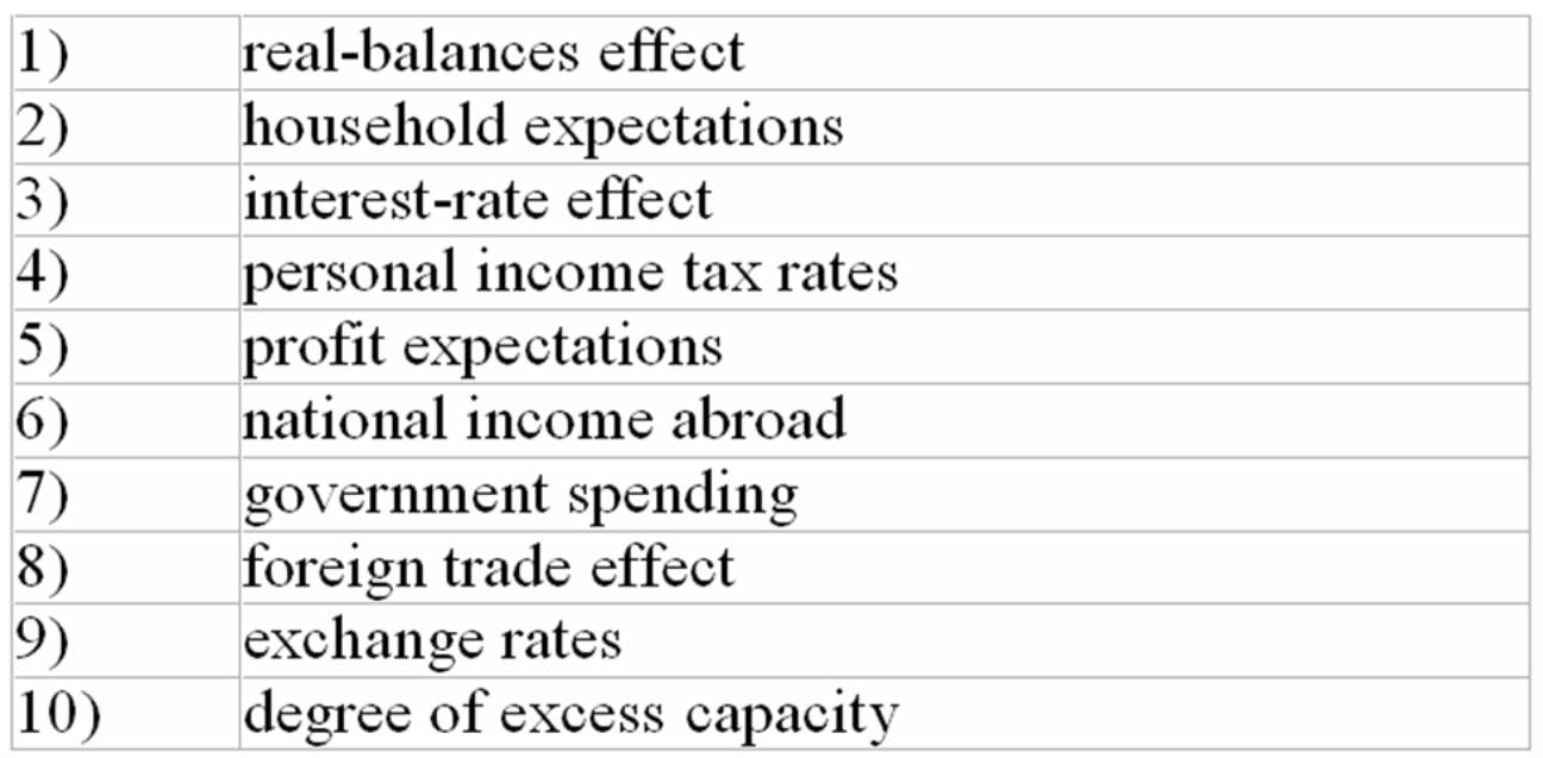
A) 1 and 3
B) 2 and 4
C) 5 and 10
D) 8 and 9
The following list of factors,are related to the aggregate demand curve.

A) 1 and 3
B) 2 and 4
C) 5 and 10
D) 8 and 9

Unlock Deck
Unlock for access to all 229 flashcards in this deck.
Unlock Deck
k this deck
37
An increase in taxes will cause a(n):
A) decrease in the quantity of real domestic output demanded.
B) increase in the quantity of real domestic output demanded.
C) decrease in aggregate demand.
D) increase in aggregate demand.
A) decrease in the quantity of real domestic output demanded.
B) increase in the quantity of real domestic output demanded.
C) decrease in aggregate demand.
D) increase in aggregate demand.

Unlock Deck
Unlock for access to all 229 flashcards in this deck.
Unlock Deck
k this deck
38
Which of the diagrams below best portrays the effects of an increase in consumer spending? 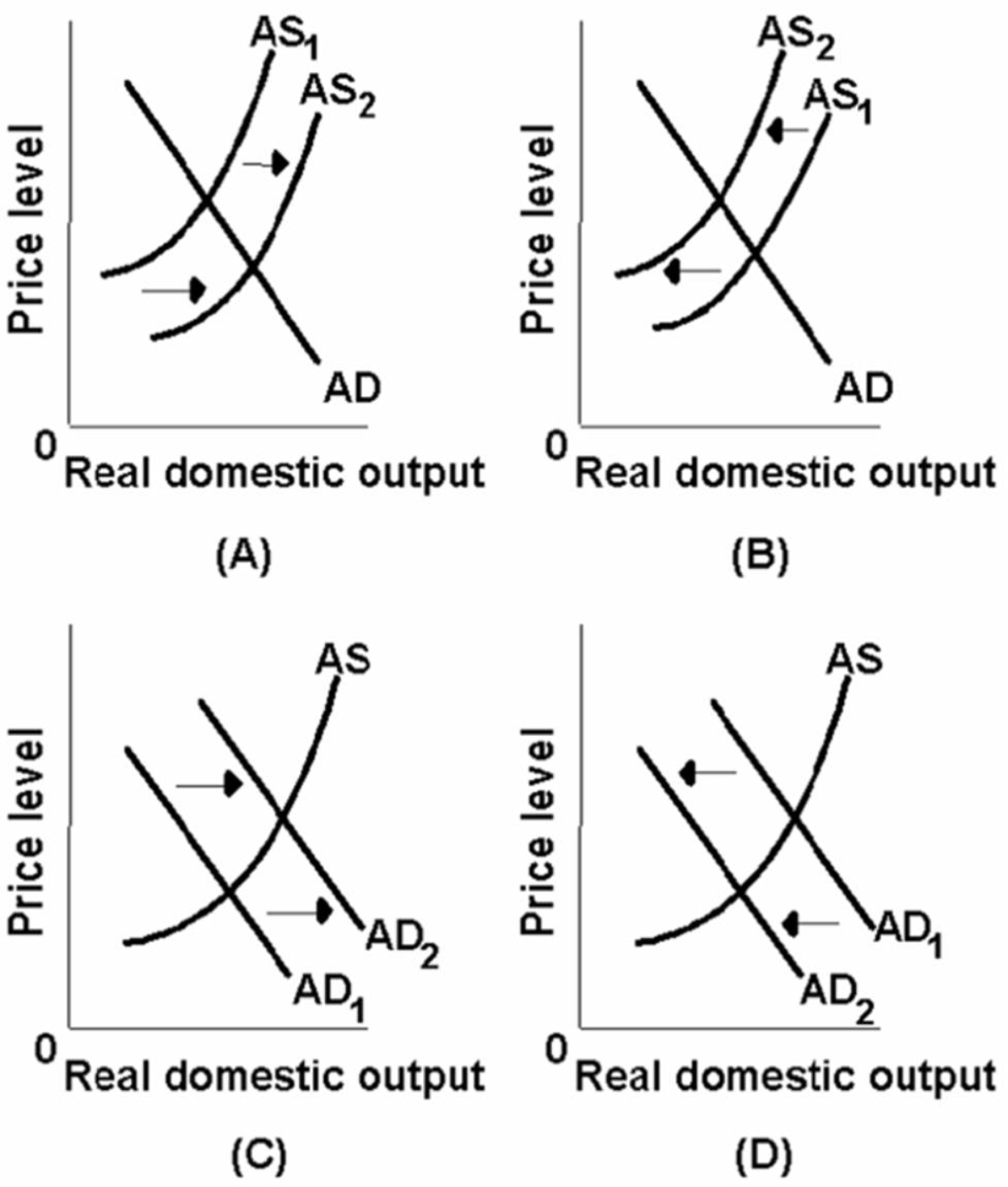
A) A
B) B
C) C
D) D

A) A
B) B
C) C
D) D

Unlock Deck
Unlock for access to all 229 flashcards in this deck.
Unlock Deck
k this deck
39
A decrease in taxes will cause a(n):
A) decrease in the quantity of real domestic output demanded.
B) increase in the quantity of real domestic output demanded.
C) increase in aggregate demand.
D) decrease in aggregate demand.
A) decrease in the quantity of real domestic output demanded.
B) increase in the quantity of real domestic output demanded.
C) increase in aggregate demand.
D) decrease in aggregate demand.

Unlock Deck
Unlock for access to all 229 flashcards in this deck.
Unlock Deck
k this deck
40
When the excess capacity of business rises,aggregate:
A) demand increases.
B) demand decreases.
C) supply increases.
D) supply decreases.
A) demand increases.
B) demand decreases.
C) supply increases.
D) supply decreases.

Unlock Deck
Unlock for access to all 229 flashcards in this deck.
Unlock Deck
k this deck
41
The short-run aggregate supply curve is upward-sloping because:
A) of the interest-rate effect.
B) higher price levels create incentives to expand output when resource prices remain constant.
C) of the net export effect.
D) higher price levels create an expectation among producers of still higher price levels.
A) of the interest-rate effect.
B) higher price levels create incentives to expand output when resource prices remain constant.
C) of the net export effect.
D) higher price levels create an expectation among producers of still higher price levels.

Unlock Deck
Unlock for access to all 229 flashcards in this deck.
Unlock Deck
k this deck
42
Refer to the diagram below.Which of the following would shift the aggregate demand curve from AD2 to AD1? 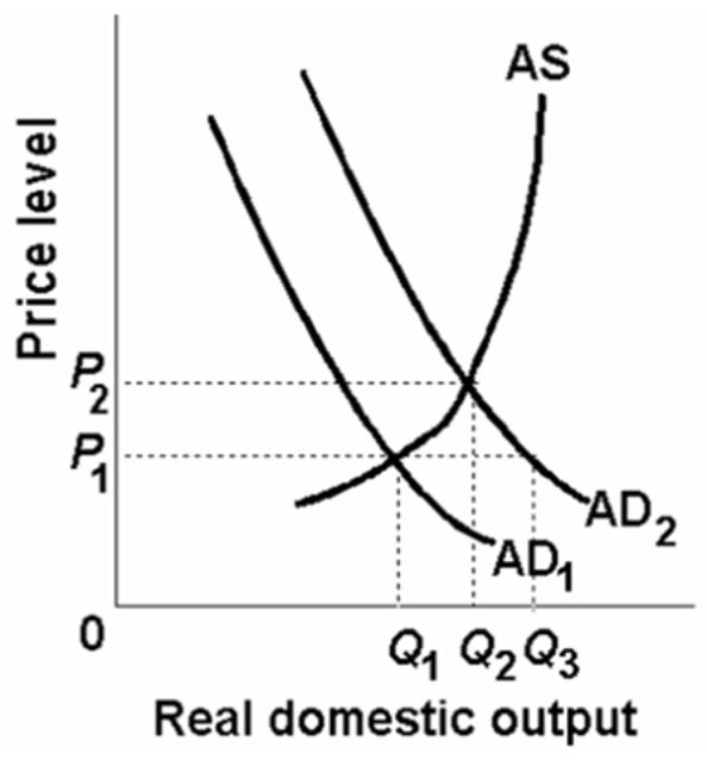
A) a decline in personal income tax rates
B) an increase in the international value of the dollar
C) an increase in government spending
D) an upward revision of profit expectations on investment projects

A) a decline in personal income tax rates
B) an increase in the international value of the dollar
C) an increase in government spending
D) an upward revision of profit expectations on investment projects

Unlock Deck
Unlock for access to all 229 flashcards in this deck.
Unlock Deck
k this deck
43
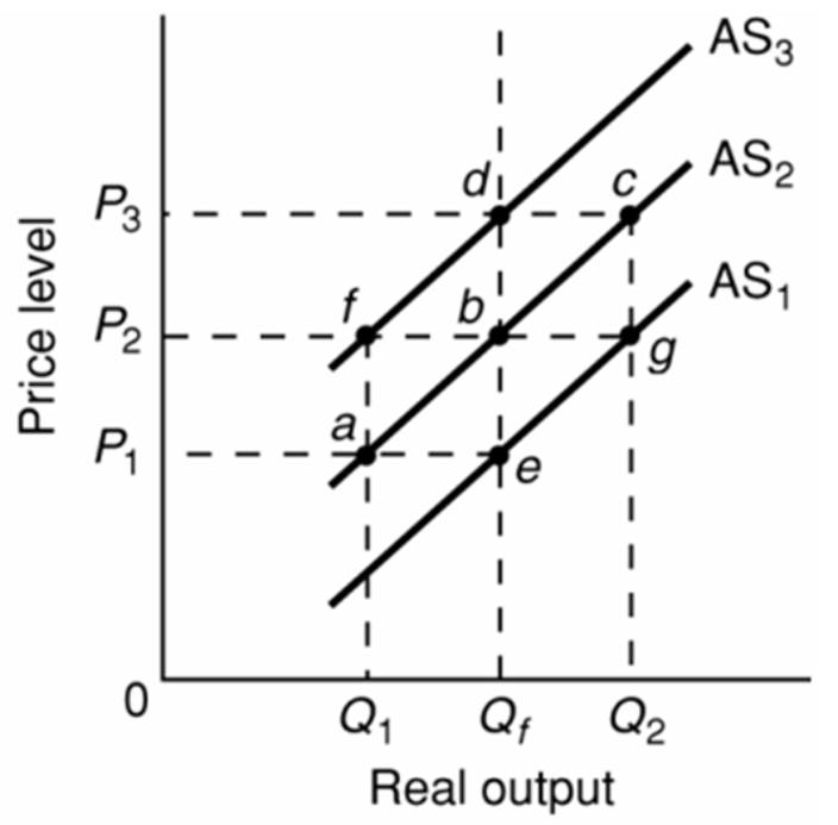
Refer to the above diagram.Assume that nominal wages initially are set on the basis of the price level P2 and that the economy initially is operating at its full-employment level of output Qf.In the short run,an increase in the price level from P2 to P3 will:
A) change aggregate supply from AS2 to AS3.
B) increase real output from Q1 to Q2.
C) change aggregate supply from AS2 to AS1.
D) increase real output from Qf to Q2.

Unlock Deck
Unlock for access to all 229 flashcards in this deck.
Unlock Deck
k this deck
44
Refer to the information below.Investment spending would most likely be influenced by changes in:
The following list of factors,are related to the aggregate demand curve.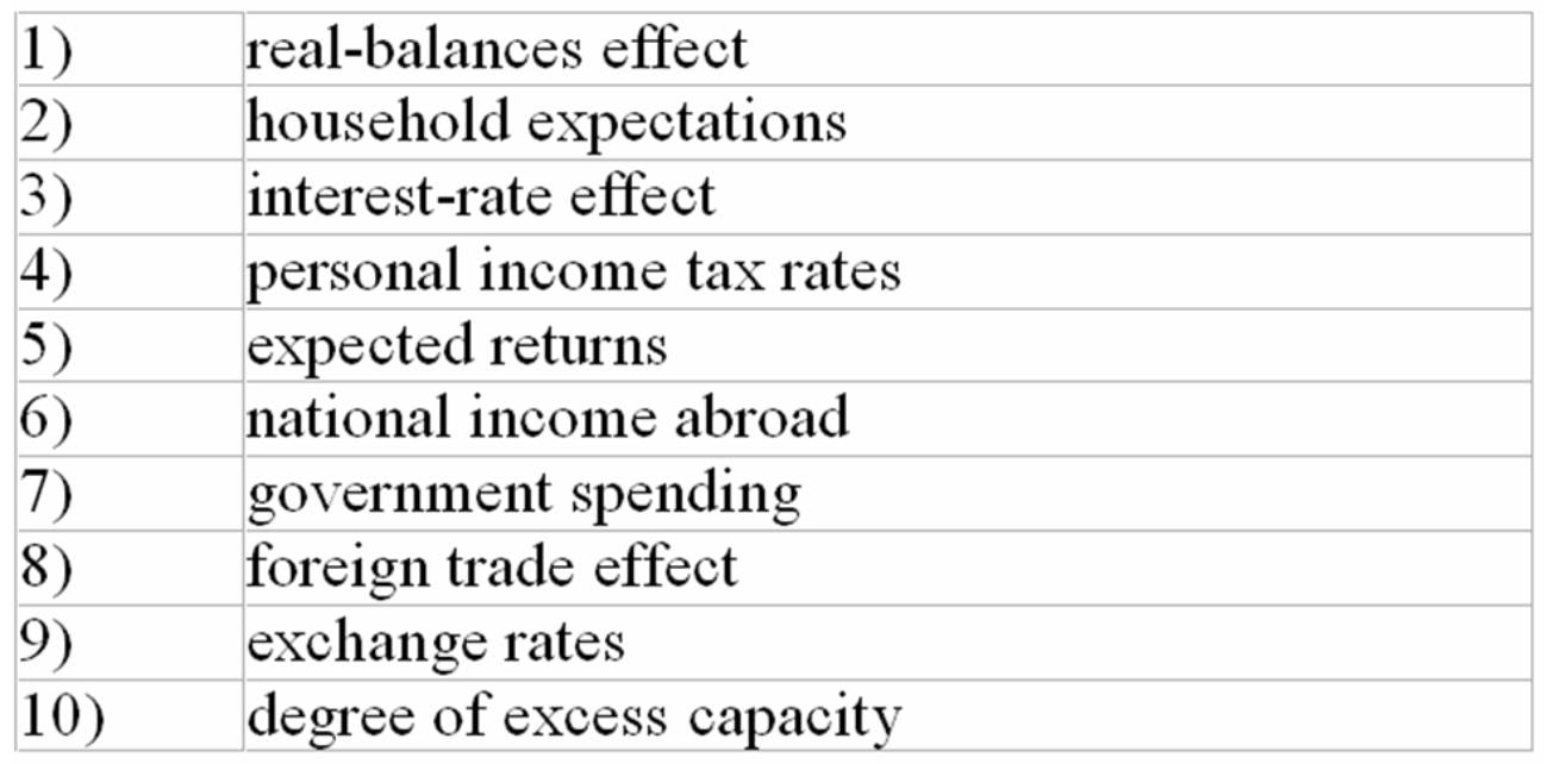
A) 1 and 3.
B) 4 and 6.
C) 5 and 10.
D) 8 and 9.
The following list of factors,are related to the aggregate demand curve.

A) 1 and 3.
B) 4 and 6.
C) 5 and 10.
D) 8 and 9.

Unlock Deck
Unlock for access to all 229 flashcards in this deck.
Unlock Deck
k this deck
45
With output and input prices fixed,the immediate short run aggregate supply curve is:
A) vertical.
B) upward sloping.
C) horizontal.
D) downward sloping.
A) vertical.
B) upward sloping.
C) horizontal.
D) downward sloping.

Unlock Deck
Unlock for access to all 229 flashcards in this deck.
Unlock Deck
k this deck
46
Other things equal,an increase in the price level will:
A) shift the short run aggregate supply curve to the right.
B) shift the aggregate demand curve to the right.
C) cause a movement up along a short-run aggregate supply curve.
D) cause a movement down a short run aggregate supply curve.
A) shift the short run aggregate supply curve to the right.
B) shift the aggregate demand curve to the right.
C) cause a movement up along a short-run aggregate supply curve.
D) cause a movement down a short run aggregate supply curve.

Unlock Deck
Unlock for access to all 229 flashcards in this deck.
Unlock Deck
k this deck
47
Refer to the information below.A change in net export spending would most likely be caused by changes in:
The following list of factors is related to the aggregate demand curve.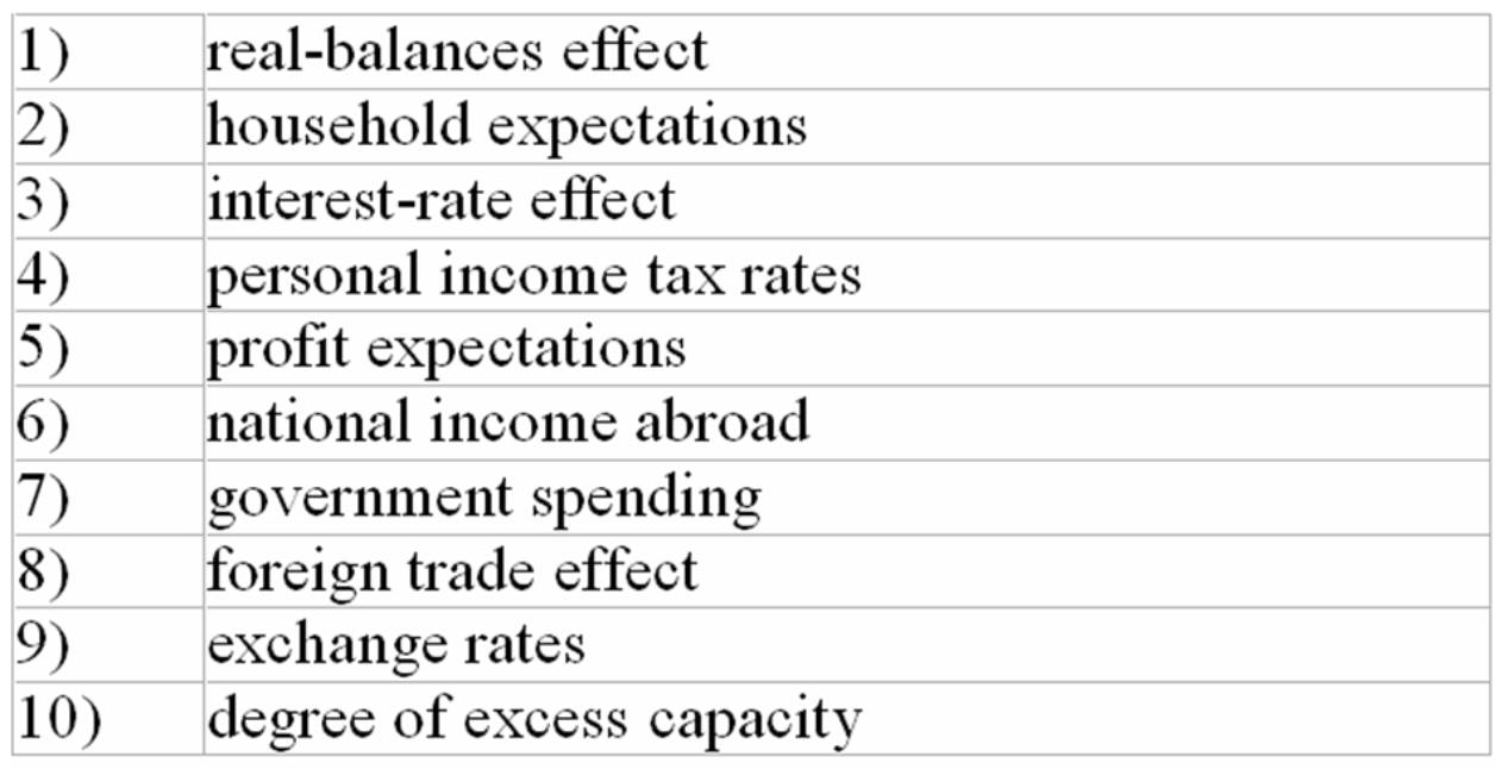
A) 2 and 3.
B) 5 and 6.
C) 7 and 8.
D) 6 and 9.
The following list of factors is related to the aggregate demand curve.

A) 2 and 3.
B) 5 and 6.
C) 7 and 8.
D) 6 and 9.

Unlock Deck
Unlock for access to all 229 flashcards in this deck.
Unlock Deck
k this deck
48
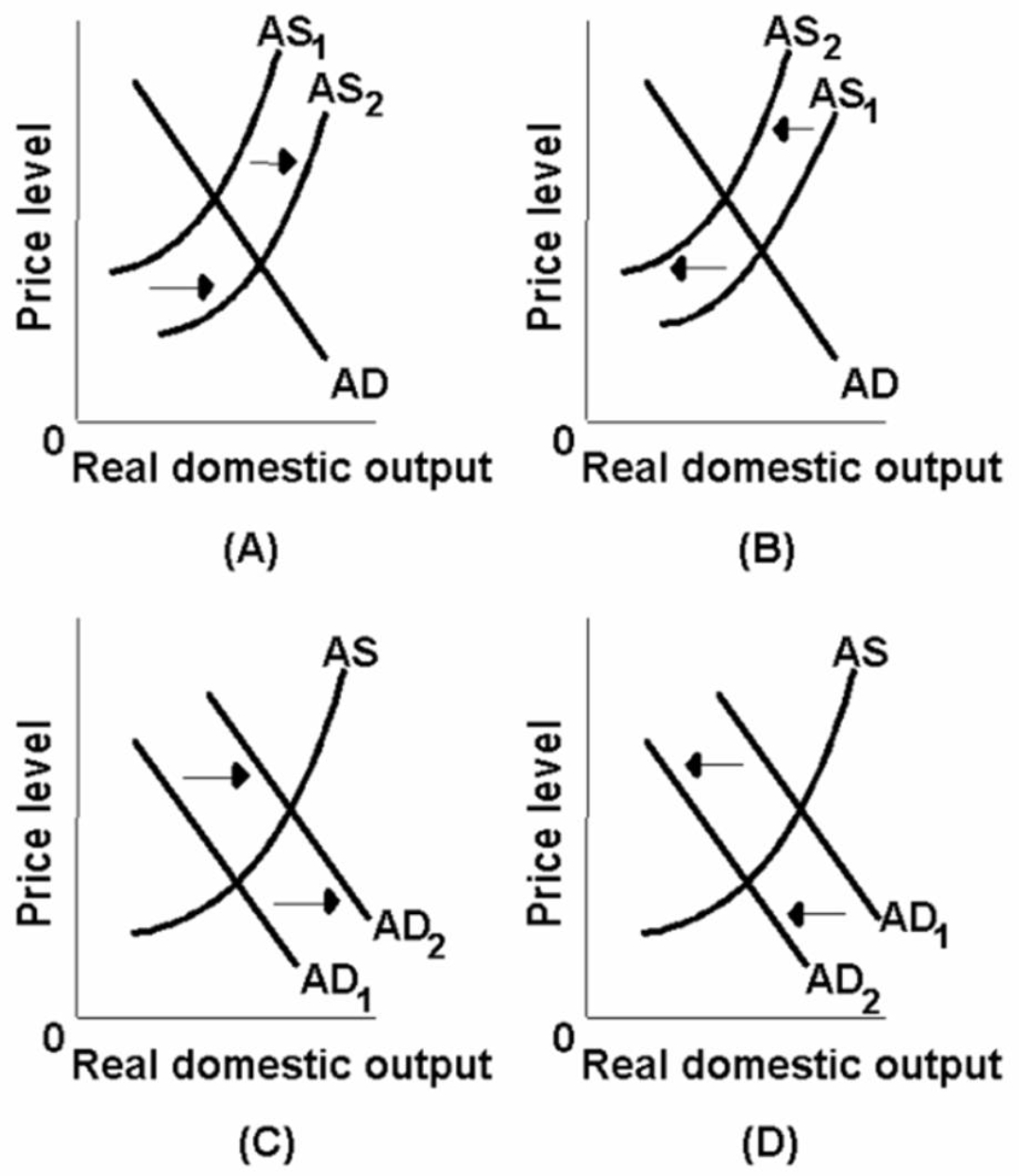
Which of the above diagrams best portrays the effects of declines in the incomes of other major nations with whom we trade?
A) A
B) B
C) C
D) D

Unlock Deck
Unlock for access to all 229 flashcards in this deck.
Unlock Deck
k this deck
49
In terms of aggregate supply,in the immediate short run:
A) the price level is variable.
B) real output is fixed.
C) nominal wages are variable.
D) both input prices and output prices are fixed.
A) the price level is variable.
B) real output is fixed.
C) nominal wages are variable.
D) both input prices and output prices are fixed.

Unlock Deck
Unlock for access to all 229 flashcards in this deck.
Unlock Deck
k this deck
50
Refer to the above diagram.If the price level rises above P1 because of an increase in aggregate demand,the:
A) economy will move up along curve B and output will temporarily increase.
B) long-run aggregate supply curve C will shift upward.
C) short-run aggregate supply curve B will automatically shift to the right.
D) economy's output first will decline,then increase,and finally return to Q1.
A) economy will move up along curve B and output will temporarily increase.
B) long-run aggregate supply curve C will shift upward.
C) short-run aggregate supply curve B will automatically shift to the right.
D) economy's output first will decline,then increase,and finally return to Q1.

Unlock Deck
Unlock for access to all 229 flashcards in this deck.
Unlock Deck
k this deck
51
Other things being equal,if the national incomes of our major international lending partners were to rise,our:
A) aggregate demand curve would shift to the right.
B) aggregate supply curve would shift to the left.
C) aggregate supply curve would shift to the right.
D) aggregate demand curve would shift to the left.
A) aggregate demand curve would shift to the right.
B) aggregate supply curve would shift to the left.
C) aggregate supply curve would shift to the right.
D) aggregate demand curve would shift to the left.

Unlock Deck
Unlock for access to all 229 flashcards in this deck.
Unlock Deck
k this deck
52

Which of the above diagrams best portrays the effects of an increase in foreign spending on our products?
A) A
B) B
C) C
D) D

Unlock Deck
Unlock for access to all 229 flashcards in this deck.
Unlock Deck
k this deck
53
The short run aggregate supply curve:
A) shows the various amounts of real output which businesses will produce at each price level.
B) is downward sloping because real purchasing power increases as the price level falls.
C) contains a vertical range where real output is variable and the price level is constant.
D) is explained by the interest rate,wealth,and foreign trade effects.
A) shows the various amounts of real output which businesses will produce at each price level.
B) is downward sloping because real purchasing power increases as the price level falls.
C) contains a vertical range where real output is variable and the price level is constant.
D) is explained by the interest rate,wealth,and foreign trade effects.

Unlock Deck
Unlock for access to all 229 flashcards in this deck.
Unlock Deck
k this deck
54
A decrease in government spending will cause a(n):
A) increase in the quantity of real domestic output demanded.
B) decrease in the quantity of real domestic output demanded.
C) decrease in aggregate demand.
D) increase in aggregate demand.
A) increase in the quantity of real domestic output demanded.
B) decrease in the quantity of real domestic output demanded.
C) decrease in aggregate demand.
D) increase in aggregate demand.

Unlock Deck
Unlock for access to all 229 flashcards in this deck.
Unlock Deck
k this deck
55

Which of the above diagrams best portrays the effects of a substantial reduction in government spending?
A) A
B) B
C) C
D) D

Unlock Deck
Unlock for access to all 229 flashcards in this deck.
Unlock Deck
k this deck
56
The horizontal shape of the immediate short run aggregate supply implies that:
A) the total amount of output in the economy depends only on the general price level.
B) the total amount of output in the economy depends only on the volume of spending.
C) the total amount of output in the economy is fixed.
D) the total amount of spending depends on the price of inputs.
A) the total amount of output in the economy depends only on the general price level.
B) the total amount of output in the economy depends only on the volume of spending.
C) the total amount of output in the economy is fixed.
D) the total amount of spending depends on the price of inputs.

Unlock Deck
Unlock for access to all 229 flashcards in this deck.
Unlock Deck
k this deck
57
In terms of aggregate supply,the short run is a period in which:
A) the price level is fixed.
B) employment is fixed.
C) real output is fixed.
D) nominal wages and other input prices are fixed.
A) the price level is fixed.
B) employment is fixed.
C) real output is fixed.
D) nominal wages and other input prices are fixed.

Unlock Deck
Unlock for access to all 229 flashcards in this deck.
Unlock Deck
k this deck
58
Which of the following would not shift the aggregate supply curve?
A) an increase in labour productivity
B) a decline in the price of imported oil
C) a decline in business taxes
D) an increase in the price level
A) an increase in labour productivity
B) a decline in the price of imported oil
C) a decline in business taxes
D) an increase in the price level

Unlock Deck
Unlock for access to all 229 flashcards in this deck.
Unlock Deck
k this deck
59
Refer to the list below.Which two factors would most likely cause a change in investment spending?
The following list of items is related to aggregate demand.
A) 2 and 5
B) 3 and 10
C) 2 and 7
D) 6 and 9
The following list of items is related to aggregate demand.

A) 2 and 5
B) 3 and 10
C) 2 and 7
D) 6 and 9

Unlock Deck
Unlock for access to all 229 flashcards in this deck.
Unlock Deck
k this deck
60
Other things equal,a decrease in the price level will:
A) shift the short run aggregate supply curve to the left.
B) shift the aggregate demand curve to the left.
C) cause a movement up a short-run aggregate supply curve.
D) cause a movement down a short run aggregate supply curve.
A) shift the short run aggregate supply curve to the left.
B) shift the aggregate demand curve to the left.
C) cause a movement up a short-run aggregate supply curve.
D) cause a movement down a short run aggregate supply curve.

Unlock Deck
Unlock for access to all 229 flashcards in this deck.
Unlock Deck
k this deck
61
An increase in productivity will shift the aggregate:
A) demand curve leftward.
B) demand curve rightward.
C) supply curve rightward.
D) supply curve leftward.
A) demand curve leftward.
B) demand curve rightward.
C) supply curve rightward.
D) supply curve leftward.

Unlock Deck
Unlock for access to all 229 flashcards in this deck.
Unlock Deck
k this deck
62
Refer to the table below.If this nation's aggregate supply schedule graphs as a vertical line at the $25 billion level of real GDP,its price level will be:
The following table is for a particular country in which C is consumption expenditures,Ig is gross investment expenditures,G is government expenditures,X is exports,and M is imports.All figures are in billions of dollars.
A) 128
B) 125
C) 122
D) 119
The following table is for a particular country in which C is consumption expenditures,Ig is gross investment expenditures,G is government expenditures,X is exports,and M is imports.All figures are in billions of dollars.

A) 128
B) 125
C) 122
D) 119

Unlock Deck
Unlock for access to all 229 flashcards in this deck.
Unlock Deck
k this deck
63
Suppose the full-employment level of real output (Q)for a hypothetical economy is $500 and that the price level (P)initially is 100.Use the following short-run aggregate supply schedules to answer the next question.

Refer to the information above.In the long run,a fall in the price level from 100 to 75 will:
A) decrease real output from $500 to $440.
B) increase real output from $500 to $620.
C) change the aggregate supply schedule from (a)to (c)and produce an equilibrium level of real output of $500.
D) change the aggregate supply schedule from (a)to (b)and produce an equilibrium level of real output of $500.

Refer to the information above.In the long run,a fall in the price level from 100 to 75 will:
A) decrease real output from $500 to $440.
B) increase real output from $500 to $620.
C) change the aggregate supply schedule from (a)to (c)and produce an equilibrium level of real output of $500.
D) change the aggregate supply schedule from (a)to (b)and produce an equilibrium level of real output of $500.

Unlock Deck
Unlock for access to all 229 flashcards in this deck.
Unlock Deck
k this deck
64
The long-run aggregate supply curve is vertical:
A) because the rate of inflation is steady in the long run.
B) because resource prices eventually catch up with product prices.
C) because product prices always increase at a faster rate than resource prices.
D) only when the money supply increases at the same rate as real GDP.
A) because the rate of inflation is steady in the long run.
B) because resource prices eventually catch up with product prices.
C) because product prices always increase at a faster rate than resource prices.
D) only when the money supply increases at the same rate as real GDP.

Unlock Deck
Unlock for access to all 229 flashcards in this deck.
Unlock Deck
k this deck
65
In terms of aggregate supply,the difference between the long run and the short run is that in the long run:
A) the price level is variable.
B) employment is variable.
C) real output is variable.
D) nominal wages and other input prices are variable.
A) the price level is variable.
B) employment is variable.
C) real output is variable.
D) nominal wages and other input prices are variable.

Unlock Deck
Unlock for access to all 229 flashcards in this deck.
Unlock Deck
k this deck
66
Suppose that nominal wages fall and productivity rises in a particular economy.Other things equal,the aggregate:
A) demand curve will shift leftward.
B) supply curve will shift rightward.
C) supply curve will shift leftward.
D) expenditures curve will shift downward.
A) demand curve will shift leftward.
B) supply curve will shift rightward.
C) supply curve will shift leftward.
D) expenditures curve will shift downward.

Unlock Deck
Unlock for access to all 229 flashcards in this deck.
Unlock Deck
k this deck
67
The long run aggregate supply:
A) is downward sloping.
B) is vertical.
C) is horizontal.
D) is upward sloping.
A) is downward sloping.
B) is vertical.
C) is horizontal.
D) is upward sloping.

Unlock Deck
Unlock for access to all 229 flashcards in this deck.
Unlock Deck
k this deck
68
Which of the following is true of aggregate supply in the long run?
A) Nominal wages and output prices are both fixed.
B) Nominal wages are fixed but output prices can vary.
C) Output prices are fixed.
D) Nominal wages are fully responsive to changes in the price level.
A) Nominal wages and output prices are both fixed.
B) Nominal wages are fixed but output prices can vary.
C) Output prices are fixed.
D) Nominal wages are fully responsive to changes in the price level.

Unlock Deck
Unlock for access to all 229 flashcards in this deck.
Unlock Deck
k this deck
69
Other things being equal,if world oil prices increased by 70 percent then the most likely effect would be to:
A) shift the aggregate demand curve right.
B) shift the aggregate supply curve right.
C) shift the aggregate supply curve left.
D) shift the aggregate demand curve right and the aggregate supply curve left.
A) shift the aggregate demand curve right.
B) shift the aggregate supply curve right.
C) shift the aggregate supply curve left.
D) shift the aggregate demand curve right and the aggregate supply curve left.

Unlock Deck
Unlock for access to all 229 flashcards in this deck.
Unlock Deck
k this deck
70
Suppose the full-employment level of real output (Q)for a hypothetical economy is $500 and that the price level (P)initially is 100.Use the following short-run aggregate supply schedules to answer the next question.

Refer to the information above.If the price level unexpectedly declines from 100 to 75,the level of real output in the short run will:
A) rise from $500 to $560.
B) fall from $500 to $440.
C) fall from $560 to $500.
D) rise from $440 to $500.

Refer to the information above.If the price level unexpectedly declines from 100 to 75,the level of real output in the short run will:
A) rise from $500 to $560.
B) fall from $500 to $440.
C) fall from $560 to $500.
D) rise from $440 to $500.

Unlock Deck
Unlock for access to all 229 flashcards in this deck.
Unlock Deck
k this deck
71
Suppose the full-employment level of real output (Q)for a hypothetical economy is $500 and that the price level (P)initially is 100.Use the following short-run aggregate supply schedules to answer the next question.

Refer to the information above.In the long run,an increase in the price level from 100 to 125 will:
A) increase real output from $500 to $560.
B) decrease real output from $500 to $440.
C) change the aggregate supply schedule from (a)to (c)and result in an equilibrium level of real output of $560.
D) change the aggregate supply schedule from (a)to (b)and result in an equilibrium level of real output of $500.

Refer to the information above.In the long run,an increase in the price level from 100 to 125 will:
A) increase real output from $500 to $560.
B) decrease real output from $500 to $440.
C) change the aggregate supply schedule from (a)to (c)and result in an equilibrium level of real output of $560.
D) change the aggregate supply schedule from (a)to (b)and result in an equilibrium level of real output of $500.

Unlock Deck
Unlock for access to all 229 flashcards in this deck.
Unlock Deck
k this deck
72
A change in aggregate supply would be caused by a change in:
A) the price level.
B) aggregate demand.
C) an aggregate supply determinant.
D) the quantity of real output supplied.
A) the price level.
B) aggregate demand.
C) an aggregate supply determinant.
D) the quantity of real output supplied.

Unlock Deck
Unlock for access to all 229 flashcards in this deck.
Unlock Deck
k this deck
73
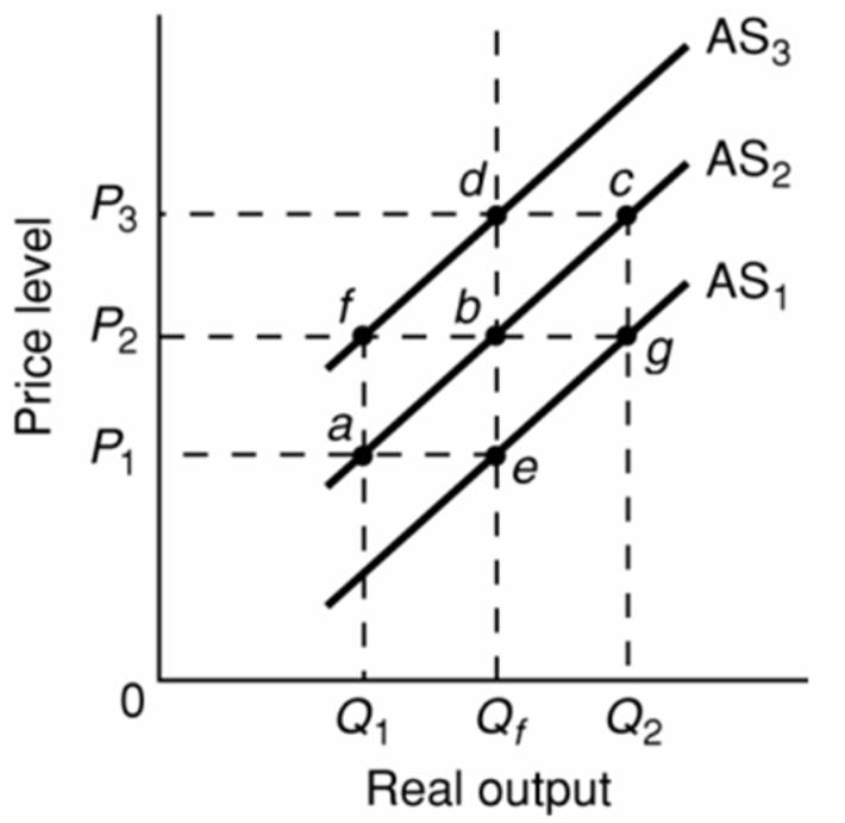
Refer to the above diagram.Assume that nominal wages initially are set on the basis of the price level P2 and that the economy initially is operating at its full-employment level of output Qf.In the long run,an increase in the price level from P2 to P3 will:
A) increase real output from Qf to Q2.
B) change aggregate supply from AS2 to AS1.
C) decrease real output from Q2 to Q1.
D) not change the level of real output.

Unlock Deck
Unlock for access to all 229 flashcards in this deck.
Unlock Deck
k this deck
74

Refer to the above diagram.Assume that nominal wages initially are set on the basis of the price level P2 and that the economy initially is operating at its full-employment level of output Qf.In terms of this diagram,the long-run aggregate supply curve:
A) is AS2.
B) is a vertical line extending from Qf upward through e,b,and d.
C) may be either AS1,AS2,or AS3 depending on whether the price level is P1,P2,or P3.
D) is a horizontal line extending from P2 rightward through f,b,and g.

Unlock Deck
Unlock for access to all 229 flashcards in this deck.
Unlock Deck
k this deck
75
Refer to the data below.The vertical range of the aggregate supply curve is associated with price levels:
The following aggregate demand and supply schedules are for a hypothetical economy:
A) 150 and 200.
B) 150 and 300.
C) 200 and 250.
D) 250 and 300.
The following aggregate demand and supply schedules are for a hypothetical economy:

A) 150 and 200.
B) 150 and 300.
C) 200 and 250.
D) 250 and 300.

Unlock Deck
Unlock for access to all 229 flashcards in this deck.
Unlock Deck
k this deck
76
Suppose the full-employment level of real output (Q)for a hypothetical economy is $500 and that the price level (P)initially is 100.Use the following short-run aggregate supply schedules to answer the next question.

Refer to the information above.If the price level unexpectedly increases from 100 to 125,the level of real output in the short run will:
A) rise from $500 to $560.
B) fall from $500 to $440.
C) fall from $560 to $500.
D) rise from $440 to $500.

Refer to the information above.If the price level unexpectedly increases from 100 to 125,the level of real output in the short run will:
A) rise from $500 to $560.
B) fall from $500 to $440.
C) fall from $560 to $500.
D) rise from $440 to $500.

Unlock Deck
Unlock for access to all 229 flashcards in this deck.
Unlock Deck
k this deck
77
The determinants of aggregate supply:
A) are consumption,investment,government,and net export spending.
B) explain why real domestic output and the price level are directly related.
C) explain the three distinct ranges of the aggregate supply curve.
D) include input prices and r productivity.
A) are consumption,investment,government,and net export spending.
B) explain why real domestic output and the price level are directly related.
C) explain the three distinct ranges of the aggregate supply curve.
D) include input prices and r productivity.

Unlock Deck
Unlock for access to all 229 flashcards in this deck.
Unlock Deck
k this deck
78
Shifts in the aggregate supply curve are caused by changes in:
A) consumption spending.
B) the quantity of real output demanded.
C) the quantity of real output supplied.
D) one or more of the determinants of aggregate supply.
A) consumption spending.
B) the quantity of real output demanded.
C) the quantity of real output supplied.
D) one or more of the determinants of aggregate supply.

Unlock Deck
Unlock for access to all 229 flashcards in this deck.
Unlock Deck
k this deck
79
Other things equal,the short-run aggregate supply curve shifts positions when:
A) the price level changes.
B) the rate of inflation changes.
C) input prices change.
D) aggregate demand changes.
A) the price level changes.
B) the rate of inflation changes.
C) input prices change.
D) aggregate demand changes.

Unlock Deck
Unlock for access to all 229 flashcards in this deck.
Unlock Deck
k this deck
80
A rightward shift in the aggregate supply curve might best be explained by:
A) an increase in business taxes.
B) a decrease in productivity.
C) an increase in nominal wages.
D) a decrease in the price of imported resources.
A) an increase in business taxes.
B) a decrease in productivity.
C) an increase in nominal wages.
D) a decrease in the price of imported resources.

Unlock Deck
Unlock for access to all 229 flashcards in this deck.
Unlock Deck
k this deck


